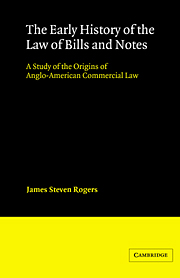 The Early History of the Law of Bills and Notes
The Early History of the Law of Bills and Notes Book contents
- Frontmatter
- Contents
- Preface
- Table of cases and precedents
- Note on citation
- Introduction
- 1 The central courts, commercial law, and the law merchant
- 2 Early exchange transactions: commercial practice
- 3 Early exchange transactions: private law
- 4 Early exchange transactions: public law and policy
- 5 From exchange transactions to bills of exchange: the transformation of commercial practice
- 6 The custom of merchants and the development of the law of bills
- 7 The civilians and the law of bills in the seventeenth century
- 8 Transferability and negotiability
- 9 The law of bills and notes in the eighteenth century
- 10 The problem of accommodation bills
- Conclusion
- Bibliography
- Index
6 - The custom of merchants and the development of the law of bills
Published online by Cambridge University Press: 22 September 2009
- Frontmatter
- Contents
- Preface
- Table of cases and precedents
- Note on citation
- Introduction
- 1 The central courts, commercial law, and the law merchant
- 2 Early exchange transactions: commercial practice
- 3 Early exchange transactions: private law
- 4 Early exchange transactions: public law and policy
- 5 From exchange transactions to bills of exchange: the transformation of commercial practice
- 6 The custom of merchants and the development of the law of bills
- 7 The civilians and the law of bills in the seventeenth century
- 8 Transferability and negotiability
- 9 The law of bills and notes in the eighteenth century
- 10 The problem of accommodation bills
- Conclusion
- Bibliography
- Index
Summary
The preceding chapter examined the changes in commercial and financial practice in the seventeenth and eighteenth centuries associated with the transformation of bills of exchange into instruments having economic significance independent of the older form of exchange dealings. This chapter examines the corresponding legal changes.
ACTIONS ON BILLS VERSUS ACTIONS ON EXCHANGE CONTRACTS
In chapter 3 it was shown that in the period up to the beginning of the early seventeenth century, courts of all kinds in England enforced monetary obligations arising out of exchange transactions, but none had developed any special body of law governing bills. By the seventeenth century, the situation was very different. Execution of a bill of exchange gave rise to enforceable legal obligations, regardless of whether the bill was issued in connection with an exchange transaction. The new analysis of bills is well illustrated by one of the earliest reported decisions in the central courts of an action on a bill of exchange, Edgar v. Chut (1663).
In Edgar, a butcher who had bought cattle from a Norfolk grazier persuaded a parson who had funds in London to draw a bill on his London correspondent and give it to the butcher to use in paying the grazier. The parson had instructed his London correspondent not to pay the bill until the butcher paid him the money, but the butcher went bankrupt before reimbursing the parson. The parson was held liable to pay the bill as drawer after the drawee in London dishonoured it.
- Type
- Chapter
- Information
- The Early History of the Law of Bills and NotesA Study of the Origins of Anglo-American Commercial Law, pp. 125 - 150Publisher: Cambridge University PressPrint publication year: 1995
